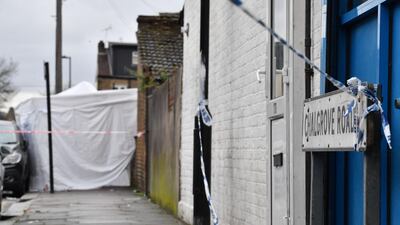London saw more murders than New York over two months this year as a spate of drug-related gang feuds was blamed for a death toll that has topped 50 this year, politicians and officials said.
The capital has experienced some of its highest levels of knife crime for a decade, tarnishing its reputation as a safe destination to live and work as the UK prepares to leave the European Union.
It has left policy-makers scrambling for solutions to the long-neglected problem of violent youth crime, said campaigners.
The spike saw 13 people killed within two weeks last month contributing to London having more murders in February and March than in New York, a city traditionally seen as a global business rival but with historically higher rates of crime and violence.
Politicians have blamed the crisis on declining police budgets, fierce competition to supply illicit drugs in the capital, and on social problems caused by fractured families and the lure of easy money with street gangs. The victims and perpetrators are disproportionately from black and minority ethnic communities, according to police statistics and analysts.
Twelve of those killed this year have been teenagers, according to London’s mayor Sadiq Khan, including the last victim, Israel Ogunsola, 18, who was stabbed to death on Wednesday.
Mr Ogunsola was a Facebook friend of a 17-year-old girl, Tanesha Melbourne, who was shot dead from a bullet fired by a passing car in north London on Monday.
Mr Khan blamed central government budget cuts of £700 million over the last seven years. “My message to the Government is please work with us to solve this national problem,” he said.
The rise in murders comes as a ground-breaking project to mediate disputes between rival gangs was forced to drastically cut its operations because of uncertainty over money, The National can reveal.
The police-funded project has been credited with preventing murders by bringing both sides together to negotiate settlements to spiralling gang disputes.
The unorthodox approach has seen mediators set up debt repayment plans between gangs in dispute over the proceeds of drugs sales. Police have justified the methods by saying it cuts murders, each of which is estimated to cost the state £1.7 million.
“When we were busy, it would have an impact on youth violence in the areas where we were working,” said Andy Simon, the chief executive of Capital Conflict Management.
He said that mediation efforts had been “massively down” in the last six months because of the funding problems at London’s main police force, which has publicly promoted the group’s work.
“They [the police] were concerned that they wouldn’t be any more money and couldn’t refer cases to because they might not be able to pay for them,” he said.
David Lammy, an MP who represents a north London constituency affected by high rates of gang violence, said that the violence was the worst that he had seen during his 18 years in parliament. London was becoming the drugs market of Europe, which was driving turf wars and a culture of brutality between rival gangs, he said.
Barry Mizen, whose son Jimmy was murdered by a gang member during the last major spike of youth violence a decade ago, said that successive governments had failed to tackle the problem.
"There are almost discarded parts of our society," he told The National. "Martin Luther King said a riot is the voice of the unheard – is this what we are seeing here?"
Cressida Dick, the chief of London’s police force, has highlighted the use of social media to taunt rival groups that has resulted in murderous violence.

